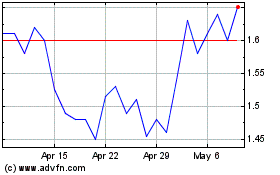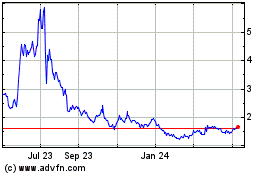Rockwell Medical, Inc. (Nasdaq: RMTI) (“Rockwell Medical” or the
“Company”), a biopharmaceutical company dedicated to transforming
the treatment of iron deficiency and iron deficiency anemia
management and improving outcomes for patients around the world,
earlier today concluded its Management and Key Opinion Leader (KOL)
conference call and webcast to discuss potential novel indications
for its ferric pyrophosphate citrate (FPC) platform. The conference
call included presentations by Rockwell Medical executive
management and Connie Sullivan, B.S. Pharm., President and CEO of
the National Home Infusion Association, and Inder Anand, M.D.,
F.R.C.P., D.Phil. (Oxon), Emeritus Professor of Medicine at the
University of Minnesota Medical School and Former Director of the
Heart Failure Program at VA Medical Center in Minneapolis.
“Earlier today, Rockwell Medical and independent
leading experts laid out the pathway for potential important value
creation for the Company through the development of the FPC
platform to treat medical conditions with unmet clinical needs
outside of the hemodialysis setting. This exciting new development
plan for FPC, along with increasing adoption of Triferic for
dialysis patients, are evidence of Rockwell Medical’s continued
focus on our vision – to transform the treatment of iron deficiency
and anemia for the millions of people affected worldwide,” said
Russell Ellison, M.D., M.Sc., President and Chief Executive Officer
of Rockwell Medical. “FPC for the treatment of iron deficiency
anemia (IDA) in home infusion patients is our top development
priority, which we view as a tractable clinical development project
with relatively low safety risk given our extensive safety database
of FPC, and low efficacy risk given our expertise and experience in
the use of parenteral iron for the treatment of IDA. We expect to
hold a Type C meeting with the U.S. Food and Drug Administration
(FDA) in the first quarter of 2021 to discuss the program further.
We are well capitalized to fund our existing dialysis business and
advance clinical development for a home infusion indication, and we
expect opportunities for multiple data read-outs and milestone
reports from the home infusion program over the next three years as
we advance the program through Phase II clinical proof-of-concept
development.”
Dr. Ellison added: “In addition, we discussed
potentially pursuing an indication for FPC in hospitalized patients
with acute heart failure. We believe FPC could be uniquely suited
for these patients, based upon a completed mechanistic
proof-of-concept study and the immediately bioavailable iron that
FPC can deliver to patients during a short hospital stay. We
continue to evaluate this opportunity and anticipate holding a Type
C meeting with the FDA in the second half of 2021 to discuss the
pathway for a potential clinical development program.”
Highlights from the conference call and webcast
are as follows:
Home Infusion
- Home infusion therapy is a rapidly
growing area of medicine, with over 3.2 million patients served in
2019. We believe the growth trend is likely to continue driven by
cost savings versus office-based or hospital care, an improving
reimbursement landscape, and emerging standards resulting from the
COVID-19 pandemic.
- IDA is a common co-morbidity in
many sub-groups of patients receiving home infusion therapy,
particularly in those receiving long-term home parenteral nutrition
(HPN).
- Management of IDA in home infusion
patients is currently a ‘broken’ process, according to the National
Home Infusion Association, due to limitations with currently
available parenteral iron products and other factors.
- FPC is uniquely suited for the
treatment of IDA in the home infusion population based upon its
kinetic profile and outstanding safety profile in both clinical
trials and post-marketing use, and may fill an unmet clinical need
as a uniquely suitable home infusion therapy for treatment of
IDA.
- Home infusion therapy patients with
IDA may be candidates for treatment with FPC across additional
therapeutic categories besides HPN. These categories include
antineoplastic chemotherapy, hydration therapy, inotropics and
biologics. The U.S. market opportunity for HPN is estimated to be
$200 million per year, and the U.S. market opportunity for the
other categories above is estimated to be $400 million per
year.
- The majority of home infusion
therapy patients are covered by commercial insurance, and payers
are increasingly motivated to reimburse home infusions to reduce
in-office visits and hospitalizations, and save costs.
- Rockwell Medical intends to hold a
Type C meeting with the FDA in Q1 2021 to discuss the pathway for
clinical development. The Company anticipates conducting a Phase II
observational study and a dose scheduling study to achieve
proof-of-concept, with the goal of ultimately securing a broad
label claim of treatment of IDA in adult patients receiving home
infusion therapy regardless of etiology.
- The Company expects Phase II data
around the end of 2021.
Acute Heart Failure
- Heart failure (HF) in the U.S. is a
large and growing patient population. More than one million
patients are hospitalized each year with acute decompensated heart
failure, and iron deficiency (ID) is a common co-morbidity in all
forms of HF.
- The acute heart failure (AHF)
opportunity for FPC is associated with a large patient population
with a high incidence of iron deficiency. FPC has theoretical acute
clinical advantages (<30 days) vs. traditional IV iron therapy
for iron deficient acute heart failure patients and could have an
impact on hospital length of stay and/or 30-day readmissions.
- The majority of heart failure
patients admitted to the hospital are insured by Medicare/Medicaid
through a well-established universal approach usually resulting in
a bundled reimbursement structure.
- Rockwell Medical intends to hold a
Type C meeting with the FDA in the second half of 2021 to discuss a
potential regulatory pathway. This meeting with the FDA will inform
whether the Company ultimately pursues an indication in AHF.
An archived webcast of the call will be
available under “Events & Presentations” in the Investor
section of the Company’s website, https://ir.rockwellmed.com/.
About Rockwell Medical
Rockwell Medical is a biopharmaceutical
company dedicated to transforming anemia management in a wide
variety of therapeutic areas and across the globe, improving the
lives of very sick patients. The Company’s initial focus is the
treatment of anemia in end-stage kidney disease
(ESKD). Rockwell Medical’s exclusive renal drug
therapies, Triferic (ferric pyrophosphate citrate) Dialysate and
Triferic AVNU (ferric pyrophosphate citrate injection), are the
only FDA-approved therapeutics indicated for iron replacement and
maintenance of hemoglobin in hemodialysis patients. Rockwell
Medical is also an established manufacturer, supplier and
leader in delivering high-quality hemodialysis
concentrates/dialysates to dialysis providers and distributors in
the U.S. and abroad.
About Triferic Dialysate and Triferic
AVNU
Triferic Dialysate and Triferic AVNU are the
only FDA-approved therapies in the U.S. indicated to
replace iron and maintain hemoglobin in hemodialysis patients
during each dialysis treatment. Triferic Dialysate and Triferic
AVNU have a unique and differentiated mechanism of action, which
has the potential to benefit patients and health care economics.
Triferic Dialysate and Triferic AVNU represent a potential
innovative medical advancement in hemodialysis patient iron
management – with the potential to become the future standard of
care.
Triferic Dialysate and Triferic AVNU both
deliver approximately 5-7 mg iron with every hemodialysis treatment
to the bone marrow and maintain hemoglobin without increasing iron
stores (ferritin). Both formulations donate iron immediately and
completely to transferrin (carrier of iron in the body) upon entry
into the blood which is then transported directly to the bone
marrow to be incorporated into hemoglobin, with no increase in
ferritin (stored iron and inflammation) and no reports of
anaphylaxis in over 1,000,000 patient administrations, addressing a
significant medical need in overcoming Functional Iron Deficiency
(FID) in ESKD patients.
Important Safety
Information
Serious hypersensitivity reactions, including
anaphylactic-type reactions, some of which have been
life-threatening and fatal, have been reported in patients
receiving parenteral iron products. Patients may present with
shock, clinically significant hypotension, loss of consciousness,
and/or collapse. Monitor patients for signs and symptoms of
hypersensitivity during and after hemodialysis until clinically
stable. Personnel and therapies should be immediately available for
the treatment of serious hypersensitivity reactions.
Hypersensitivity reactions have been reported in 1 (0.3%) of 292
patients receiving Triferic in two randomized clinical trials.
Iron status should be determined on pre-dialysis
blood samples. Post dialysis serum iron parameters may overestimate
serum iron and transferrin saturation.
The most common adverse reactions (≥3% and at
least 1% greater than placebo) in controlled clinical studies
include: procedural hypotension (21.6%), muscle spasms (9.6%),
headache (9.2%), pain in extremity (6.8%), peripheral edema (6.8%),
dyspnea (5.8%), back pain (4.5%), pyrexia (4.5%), urinary tract
infection (4.5%), asthenia (4.1%), fatigue (3.8%), arteriovenous
(AV) fistula thrombosis (3.4%), and AV fistula site hemorrhage
(3.4%).
Triferic® is a registered trademark
of Rockwell Medical, Inc.
Forward Looking Statements
Certain statements in this press release may
constitute “forward-looking statements” within the meaning of the
federal securities laws, including, but not limited to, potential
new indication opportunities for Ferric Pyrophosphate Citrate
(“FPC”), the potential for FPC to address the significant unmet
need for home infusion patients, market opportunities for new
indications, the clinical risk and safety profiles of new
indications, the development of a clinical plan and timing of FDA
review of FPC for new indications, the potential for reimbursement
of FPC for new indications, the growth of the home and specialty
infusion marketplace, the timing and success of regulatory filings
for new indications, the timing and cost of clinical development
plans and clinical study designs. Words such as, “may,” “might,”
“will,” “should,” “believe,” “expect,” “anticipate,” “estimate,”
“continue,” “could,” “can,” “would,” “develop,” “plan,”
“potential,” “predict,” “forecast,” “project,” “intend” or the
negative of these terms, and similar expressions, or statements
regarding intent, belief, or current expectations, are forward
looking statements. While Rockwell Medical believes these
forward-looking statements are reasonable, undue reliance should
not be placed on any such forward-looking statements, which are
based on information available to us on the date of this release.
These forward-looking statements are based upon current estimates
and assumptions and are subject to various risks and uncertainties
(including, without limitation, those set forth in Rockwell
Medical’s SEC filings), many of which are beyond our control and
subject to change. Actual results could be materially different.
Risks and uncertainties include, but are not limited to: the impact
of the COVID-19 pandemic (including, applicable federal, state or
local orders) on business and clinical development plans; the risk
that regulatory authorities delay or fail to approve FPC for new
indications; the risk that market opportunities are smaller than
estimated; the risk that Rockwell Medical is not able to seek
reimbursement for FPC for new indications; the risk that FPC is
unsafe for new indications; the risk that clinical study designs,
timing and costs are different than estimated; and those risks more
fully discussed in the “Risk Factors” section of our Quarterly
Report on Form 10-Q for the period ended June 30, 2020, and of our
Annual Report on Form 10-K for the year ended December 31, 2019, as
such description may be amended or updated in any future reports we
file with the SEC. Rockwell Medical expressly disclaims any
obligation to update our forward-looking statements, except as may
be required by law.
CONTACTS
Investors:Argot
Partners212.600.1902Rockwell@argotpartners.com
Media:David RosenArgot
Partners212.600.1902david.rosen@argotpartners.com
Rockwell Medical (NASDAQ:RMTI)
Historical Stock Chart
From Mar 2024 to Apr 2024

Rockwell Medical (NASDAQ:RMTI)
Historical Stock Chart
From Apr 2023 to Apr 2024
